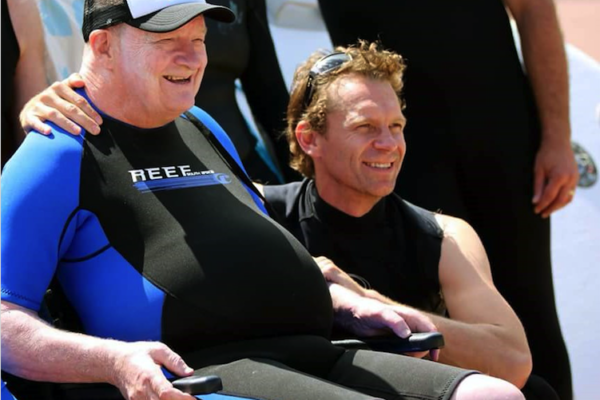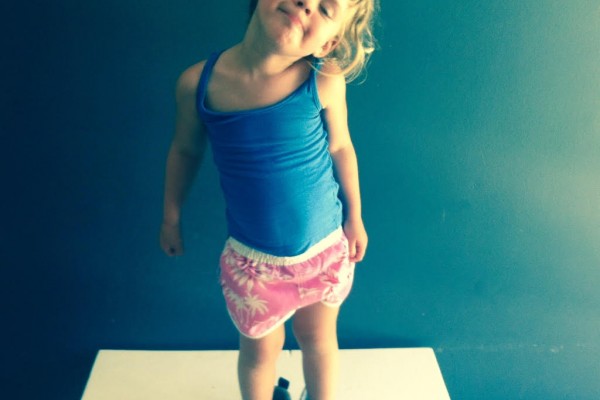I am therefore I parent
Through our example, we pass on to our kids the good, the bad and the ugly of who we are.
When Eli was almost 3, he climbed in our bed and let out a long multisyllabic fart with pride. Thrilled by his gaseous accomplishment, he then interpreted it for us: ‘My bum says, ‘Waaake uuup, its morrr-niiiing.’
I have no idea where he learns this stuff. My wife says it has something to do with someone’s example, but she’s not always right. After all, this is a grown woman who still insists on her mom hiding Easter eggs for her, and who believes that consuming all the chocolate very quickly will lead to less calorie-absorption.
But I digress, maybe she is right.
I think he learnt this behavior from me. (Both the euphonically controlled emission and an attempt at a humorous interpretation that follows.)
Bottom-sounds aside, the bottom line is that when it comes to parenting, our example is everything.
There are some dimensions to my character where my actions and my words line up. These are the good parts of who I am. My deeds and my creeds harmonize beautifully, calling out the best in my children.
But then there are aspects of my character where I tell my kids to do one thing, but I do something different – the bad parts of who I am. In this case, my actions speak louder than my words, and our kids can hardly hear what we’re saying when our lives scream something different.
Why is our example so important?
Just in case you needed more inspiration and incentive – here are three main reasons…
1. What your kids will ultimately remember about you is not what you did for them, but who you were.
In fact the older you get, the more they will see the real you. When they’re small, you can pull the wool over their eyes, but by the time they’re teens, your character stands naked before them. And the parts of you that you excused or denied or hid will eventually feed their distrust or disrespect towards you.
My mother grew up under a father who sacrificed so much for his kids, working 60-hour weeks to feed the family. She doesn’t remember that about him. Rather it is his betrayals of her mother, his drunkenness on weekends, his hypocrisy as an avid church-attender, and his authoritarian nature that seems to populate her memories of the man.
2. What they will become is what you are.
How many of us parents say, ‘I can’t believe it. I vowed not to be like my parents, but I find myself saying the things they said, and doing the things they did.’ The programming of emulation runs deep. Linda Pearson, in ‘The Discipline Miracle’ says, ‘Your child watches you to get clues on how to behave in the world. You’re her role model, so use your own behaviour to guide her. What you do is often much more important than what you say.’
As a testimony to human nature at its best, sometimes our vows to be different to our parents do work. My mom is a case in point – as a single mom, she also worked 60 hours a week, but in all the ways her father failed her, she never failed Ryan and me. But still, this ability for the next generation to get it right despite our failures, should be no excuse for us as parents not attempting to get it right now.
3. Our offspring’s capacity to trust (both us and others) hangs in the balance.
In their masterful book ‘The Parent You Want To Be,’ Dr Les and Leslie Parrot write, ‘A child who wonders time and again whether her mom or dad is being truthful will forever struggle with trust issues. And it’s not just their ability to trust their parents that will be affected. If the mistrust is deep enough, a parent can unwittingly rob a child of her capacity to make friends and find love in the years to come. Every child needs an authentic parent who is deserving of her trust. The best way to cultivate this kind of trust? To be trustworthy. For us parents to walk our talk.’
In a future post, I will tell you how to go about setting an example.
Lastly, let me express a personal concern: this idea of parenting by example is under-emphasized in the modern landscape of parental equipping.
There is so much on techniques and strategies in parenting – how to motivate and discipline your child for example – that we have come to believe parenting is primarily a matter of knowing these psychological insights and implementing various empirically verified methods. But parenting is not essentially a science. It is life. It is who I am expressed. It is my life impressed upon another life, like a mold.
Let me quote the Parrots on this one: ‘In the final analysis, your child’s character hinges on the traits you exhibit as a parent. And who you are as a parent isn’t left to fate, luck, or chance. You can choose to be the kind of parent you want to be. While plenty of things about your child’s life are unpredictable and beyond your control, you can make certain your child has a parent with particular qualities.’
When it comes to parenting, who you are radically outweighs what you do.
So, in the words of Eli, ‘Waaake uuup!’
Comments
Also published on Medium.




